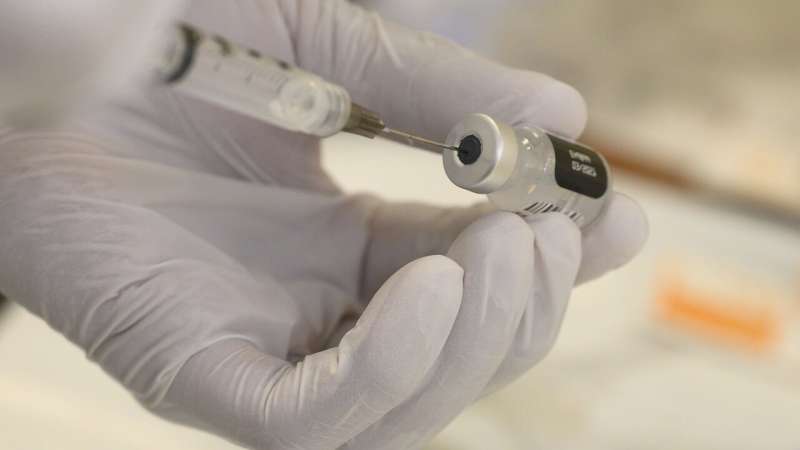This article has been reviewed according to Science X's editorial process and policies. Editors have highlighted the following attributes while ensuring the content's credibility:
fact-checked
peer-reviewed publication
trusted source
proofread
New web app for COVID-19 immune antibody helps guide vaccine timing

With SARS-COV-2 infection rates rising again, you may be wondering if you should get a COVID-19 vaccine booster shot. Yale physicians have built a tool to help answer these questions.
Shaili Gupta, MBBS, associate professor of medicine (general medicine), Yale School of Medicine, and Rebecca Slotkin, MD, postdoctoral fellow, Yale School of Medicine, created an algorithm to help with this decision-making, based on the research they started in 2020.
"We started collecting specimens before people got vaccinated and then serially after they got vaccinated. This gave us the unique opportunity to have baseline evaluations and then understand cumulative Anti-SARS-CoV-2 immune response after vaccine doses and/or infections," explained Gupta.
"We initially looked at neutralizing antibody, which is the gold standard way to determine if your body can neutralize the virus. We could then see how the antibody waxes and wanes, how it rises again when you get the booster dose, how long it lasts, and what different clinical variables impact it."
Of the >80 clinical variables studied, the team found a handful that impacts one's neutralizing antibody strength and duration after vaccination. Testing neutralizing antibodies is expensive, labor-intensive, and not available for patient care.
In an effort to make such research more easily accessible and translatable to patient care, Gupta tested the same samples on a cost-effective commercially available platform. Slotkin, Tassos C. Kyriakides, Ph.D., assistant professor of biostatistics, Yale School of Public Health, and Anupam Kundu, a former postdoctoral associate joined in to create a correlation between the commercial test result and the neutralizing antibody.
They found that two clinical variables have an impact on the correlation between the commercial platform and the neutralizing antibody: kidney function and prior COVID-19.
The team has published two papers on their findings thus far in Clinical Infectious Diseases and PLOS One.
Slotkin said the question they wanted to address was the knowledge gap around the optimal frequency of booster dosing. "We are hoping that physicians can use this tool to offer an additional perspective for complex or vaccine-hesitant patients. A serum antibody test can provide insight into the neutralizing antibody levels, which serve a protective role, especially in severe COVID-19, a disease we'd all love to prevent," said Slotkin.
Placing the predicted neutralizing antibody level within the context of how neutralizing antibodies rise and fall over time after a vaccine dose and/or COVID-19, the team created an easy-to-use app for broad use, available at Yale Spinup, a cloud-based hosting service provided by Yale University.
Xien Chen and Vinni Yu, sophomore STEM students at Yale College class of 2026, helped Gupta and Slotkin create this web app. The clinician or patient would enter an individual's COVID status, kidney function (GFR) level, and select their immunoglobin (IgG) testing method (the app accommodates multiple commercial platforms). The tool shows the predicted value of neutralizing antibody in the context of how far out others with similar clinical variables were from their vaccine dose.
The app is not intended to replace clinical judgment or offer conclusions about vaccine efficacy. The team hopes it will serve as a helpful tool for individuals who may be uncertain about the timing of their next dose of vaccine because they have had recent COVID-19 or are vaccine-hesitant.
Visit the app at https://covimmune.yale.edu/.
More information: Min Zhao et al, Serum Neutralizing Antibody Titers 12 Months After Coronavirus Disease 2019 Messenger RNA Vaccination: Correlation to Clinical Variables in an Adult, US Population, Clinical Infectious Diseases (2022). DOI: 10.1093/cid/ciac416
Rebecca Slotkin et al, Correlation of a commercial platform's results with post-vaccination SARS-CoV-2 neutralizing antibody response and clinical host factors, PLOS ONE (2023). DOI: 10.1371/journal.pone.0289713



















